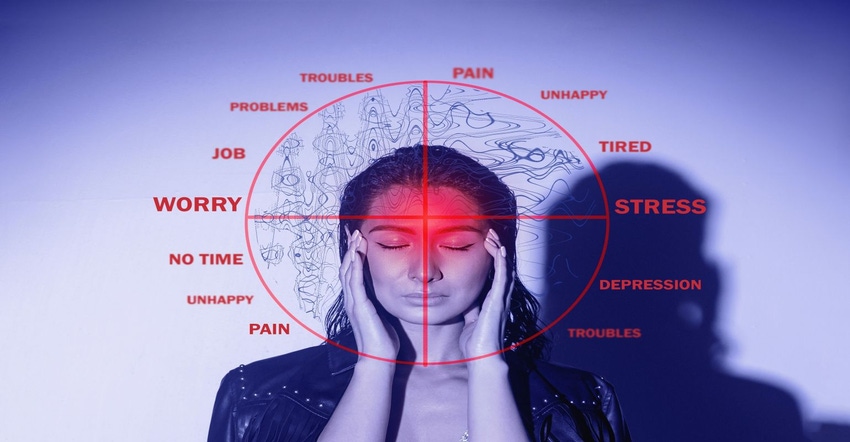In the past few years, emotional factors are increasingly taking their toll on consumers, adding to already significant concerns about optimizing and maintaining brain health.

Consumers’ continual quest for knowledge and desire to stay at the top of their game creates an ever-increasing need to maintain and optimize their brain health. While decline in brain function is most often associated with aging, developing science is just beginning to scratch the surface regarding what other factors influence brain function throughout a consumer’s lifetime. One area of particular interest is the impact of emotional factors on cognitive functioning.
In today’s environment, as consumers grapple with a fast-paced lifestyle, national and global crises, and a lingering pandemic, their mental and emotional health is being strained and stress levels are rising. Even further, with everyday distractions and 24/7 connectivity intensifying, consumers find their ability to concentrate and retain memory being drastically reduced. In effect, the brain is asked to juggle and prioritize competing bits and pieces of information. Clear thinking depends on particular neuron networks to “communicate” correctly—and stress interferes with those patterns, interrupting the ability to recall or retrieve information. More specifically, stress causes the release of a molecule which disrupts the way brain cells communicate, which affects the brain’s ability to think clearly and learn. Therefore, a heightened level of stress can physically affect a brain’s ability to function correctly, creating a decline in cognitive functioning. In fact, about half of consumers (49%) indicated they are so stressed out sometimes that it affects their ability to think clearly.
It is not surprising then, that management of cognitive issues including memory and concentration has grown 204% among the population since 2010, and 47% from 2019 (pre-pandemic) to 2022 (post-pandemic). It is interesting to note that reported management of cognitive issues is highest for younger age groups and lowest for older age groups, revealing that the younger consumers are most likely responsible for driving the high growth over the past several years. Younger consumers are also managing high levels of stress which, as previously explained, may be disrupting their neural communication networks, contributing to their reports of higher levels of cognition management.
Even further, research has shown that chronic stress can actually cause brain shrinkage, impaired memory and even an increased risk of Alzheimer’s. What is concerning is that the past few years have been emotionally challenging for consumers. They have had to deal with a worldwide pandemic, a turbulent economy, historically high inflation, global political turmoil, food shortages and empty store shelves. Therefore, the events of the last few years have created even further concern around cognitive function as approximately 2 out of 5 consumers (38%) reported they have seen a negative impact on their mental and emotional well-being since the onset of the pandemic in 2020. What’s more, Natural Marketing Institute’s research shows that since the pandemic, consumers are reporting they are more stressed out than they used to be (43%), are having difficulty getting a good night’s sleep (42%) and are more depressed than they used to be (32%). In addition, these heightened emotional states are projected to persist even as the pandemic wanes, helping to promote a continued chronic state of stress and setting the stage for the growth of future cognitive impairment issues.
New studies also reveal that isolation has a negative impact on cognition and can actually cause cognitive loss. This finding has implications for consumers as they age, as often, older people may find themselves in more isolated situations possibly due to lessened ability to get out of the house, fewer social connections and even the death of a spouse. In fact, one of the top fears of aging which appears to be more pronounced among older individuals is losing their mental or brain capacity—a concern for more than half of consumers over the age of 65. Compare this to around one-fourth of consumers ages 18-29 and 30-39 indicating it’s their biggest fear around aging, per NMI data.
The Covid-19 pandemic lockdowns and quarantines have also exacerbated feelings of isolation. Even while most of the restrictions have been lifted, the effects of isolation appear to be having a residual effect on consumers’ mental and cognitive functioning, with over a third (35%) indicating they are not as focused or concentrated on tasks as they used to be. In addition, the expansion of remote working may perpetuate feelings of isolation and lowered social connection, which may be contributing to lowered mental functioning. In fact, even in the past year, 1 out of 3 consumers indicated “not being able to socialize like they used to” is having a negative impact on their health.
In the past few years, where it appears the world has been turned on its end, emotional factors are taking their toll on consumers’ health. As 24/7 lifestyles, an uncertain economy, and national and global unrest continue to buoy up stress levels, opportunities will expand for industries in the emotional and cognitive health space—particularly as research uncovers more information regarding the interconnection of brain health and one’s emotional state.
Editor’s note: To read additional articles on the cognitive health market, click the link to download NPI’s free digital magazine, “Brain games: Ingredients for mood, balance, performance.”
As COO, Steve French ([email protected]) leads Natural Marketing Institute (NMI), a strategic consulting, market research and business development firm specializing in the health, wellness and sustainability marketplace. He has over 30 years of related experience and insight into today’s consumer and market trends, and has pioneered a range of consumer databases to help clients navigate, identify and validate market opportunities. Prior to joining NMI, French spent 15 years at PepsiCo, Mars and Marriott.
About the Author(s)
You May Also Like






.png?width=800&auto=webp&quality=80&disable=upscale)